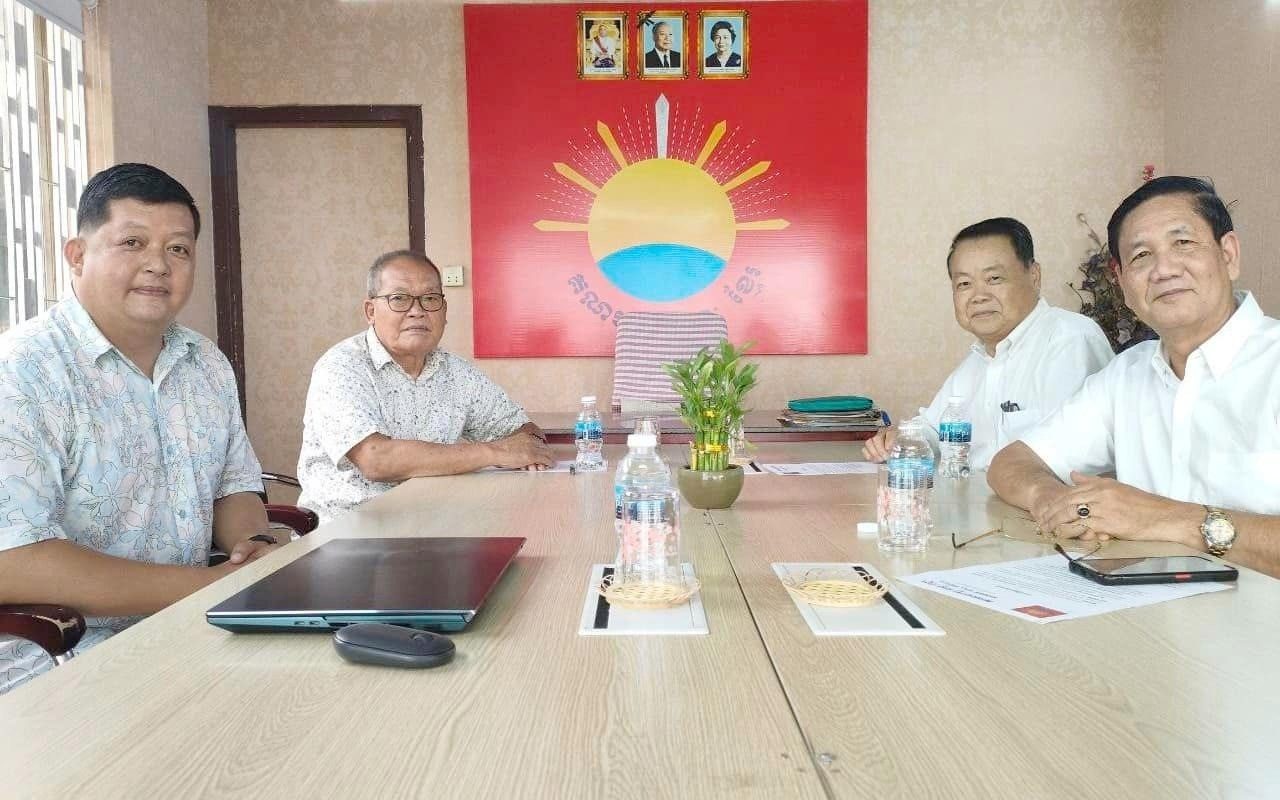The Khmer Will Party will contest the next national election with the resurgent Candlelight Party, marking a potential merging of minor opposition parties.
The Khmer Will Party is run by Kong Monika, who is the son of Kong Korm, a former president of the Candlelight Party when it was still named after party founder Sam Rainsy. The party released a statement on Monday announcing that it will not contest the next national election and will “unite” with Candlelight.
While the statement suggests a merger of parties, Monika, the party president, said on Tuesday that the parties will not merge yet, but his party will work under the umbrella of the Candlelight Party. Instead, the party would register election candidates under the bigger partner in the coalition.
“We are looking forward to merging as one party but that will be based on the actual situation,” he said. “We need time to talk with each other but for now, we are under the banner of the Candlelight Party.”
He said democrats were drawn to the Candlelight Party and the decision was supported by party supporters.
The Khmer Will Party was a minor player in the 2018 national and 2022 commune elections, and did not win any lawmaker or commune chief positions. Korm, who was foreign minister under the Vietnamese-backed People’s Republic of Kampuchea in the 1980s, was part of the Sam Rainsy Party, took over as president when Rainsy moved to the CNRP and was banned as part of 118 CNRP members outlawed by the Supreme Court.
He asked for amnesty from the five-year ban and joined his son’s Khmer Will Party in 2019 as an honorary president.
The Candlelight Party has been at the forefront of parties attempting to unseat the CPP, winning four commune chiefs, 25 first deputies and 1,360 second deputy chiefs. Other parties, including those not formed by CNRP alumni, have struggled to win seats or exert any political pressure at the 2018 and 2022 elections.
The Candlelight Party also released a statement on Tuesday welcoming the small party and appointed Korm as a “supreme adviser” to the party. Candlelight vice president Thach Setha said the Khmer Will Party will be in a kind of suspended state as its candidates register under his party for the next elections.
Rem Lak, an unsuccessful Khmer Will commune candidate in Siem Reap’s Kok Thloak Loeu commune, said she was not against the party’s decision to join Candlelight. She had previously supported the CNRP in 2013 and saw their popularity, which was now with Candlelight.
“If we are moving forward to merge together, we have more hope in competition,” she said.
The announcement is similar to the merging of the Kem Sokha-led Human Rights Party and Sam Rainsy Party in August 2012, leading to the most credible political opposition to Prime Minister Hun Sen in decades. The CNRP nearly unseated the CPP in the 2013 national election. The opposition party was dissolved in November 2017 by the Supreme Court and 118 of its senior members were banned for five years.
Four smaller opposition parties — Candlelight, Khmer Will, the Grassroots Democratic Party and Cambodia Reform Party — have been flirting with a possibility of merging or forming a coalition ahead of the next election, and posted a united front after the June commune election to push for election reforms.
GDP spokesperson Leok Sothea said the party had discussed the possibility of forming a coalition or merging into one party but had yet to make a decision. A decision was expected toward the end of October.
Sothea added that the parties had three options before them: to create a new party, contest individually with a seat-sharing agreement, or to join under the banner of a single existing party. He said Khmer Will had chosen the third option for now.
“It is a good thing as his excellency honorary president of the Khmer Will Party used to be a president of the Sam Rainsy Party. So there is nothing strange with his return to his [old] shelter and be united with each other again.”
Sothea said the GDP would prefer a seat-sharing arrangement with the other parties in which they would divvy up areas around the country in order to avoid competing in the same constituencies, but admitted that Candlelight had the biggest political capital and there would be benefits to contesting under their banner.
Ou Chanrath, founder of the Cambodia Reform Party, said their party too had held internal discussions but have so far decided not to join under Candlelight. He was unclear about the reasons, but said Candlelight had not taken a clear stand on policies and some of their leaders were not welcoming of other parties.
He said he would prefer the creation of a new party out of the three options.
He said the party was instead holding its own talks with other small parties, like the Nationalism Party, led by former CNRP lawyer Pheng Heng who now represents Kem Sokha, and the defunct Cambodia National Love Party, which has been grappling with internal party strife. These talks did not include the Yem Ponhearith-led Kampucheaniyum and the GDP.
Sok Eysan, a CPP spokesperson and senator, said four or five opposition parties were considering uniting, but now there were only two. He said the joint forces of the two parties were not a threat to the ruling party.
“The merger or alliance between the loser and the loser is just a complement to the process of democracy in Cambodia and a wish for the CPP to continue to lead the country,” he said.
The national election will be held on July 23 and could be Hun Sen’s last election if he decides to relinquish office to his son, Hun Manet, at some point in the next National Assembly term.












